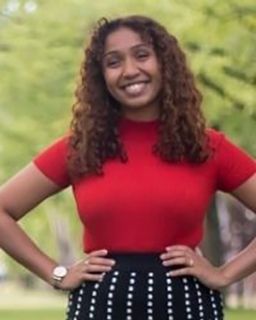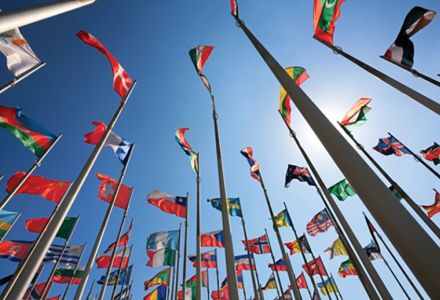Lescinska Fernandez
My dad said, 'I think Canberra is a place where you'd thrive'. From his decision I decided, you're right – this is a place where I could do really well.
For 21 year old Lescinska Fernandez, everything leads back to her dad. He is where she gets her sense of social justice from and her passion for helping others. He is responsible, she believes, for her coffee addiction. He is the reason she studied International Relations and Law. And he is why she came to ANU.
It was a Saturday morning and her father was on the phone with a friend whose daughter was studying here. She had touted the merits of ANU: #1 in Australia, great reputation for political science and IR.
“Dad was someone who always wanted the best for me and my brother,” Lescinska says. So that very day, even though she had accepted an offer to go to another university, the family piled into the car and made the three hour drive to Canberra from Sydney.
“We walked around the campus and through Copland Building because we were told that's where IR is taught,” Lescinska says. “It just happened that one of the professors, John Minns, came out and greeted us.”
Professor Minns invited them into his office for a chat, and by the time they walked out again, she and her parents had made their minds up.
“My dad said, 'I think Canberra is a place where you'd thrive',” Lescinska says. “From his decision I decided, you're right – this is a place where I could do really well.”
Lescinska wound up loving all of her IR courses – even the compulsory ones.
“ANU was the only place where you could learn about different spheres of the world, learn about economics, politics, diplomacy; really understand how key international bodies work,” she says.
Being located in the heart of the nation meant she had access to a great mix of theoretical and practical learning.
“You have all these places of politics right at your fingertips, with the embassies and the government being here.”
While ANU is the place where Lescinska received a formal education in international relations, growing up she experienced it firsthand.
Her father worked for UNICEF, and when she was around 10, the family moved to New York for three years. She and her brother attended the United Nations International School. As ten year olds, Lescinska remembers she and her classmates fundraised for earthquakes in Haiti and learned about what was happening around the world.
Learning about what her father did in his career inspired Lescinska to lead a life where she would be doing good in the world too.
“Most of my growing up I watched him help other people,” she says. “We'd be home on the weekend and he'd be on the phone. We'd be like, 'Dad, come play with us' – but he'd be helping people.”
Not that he didn't make time for Lescinska. During her time at ANU, they spoke on the phone every morning on her way to work.
“He would send me articles about women doing amazing things, challenging the stereotype or breaking the glass ceiling,” she says. “He would say, 'Les – you can achieve this. Keep pushing yourself and expanding your horizons.'”
“That constant support and reassurance and him being there always pushed me to take on new opportunities.”
Lescinska tried to recall the myriad of opportunities she's taken up at university and all that she has been involved in. She was Secretary and then President of the ANU Circle for Gender Equity. This year she participated in the 'Girls Takeover Parliament' program and wrote a speech on women in leadership that was presented in the Senate. And across the last three years, she has done more internships than she can name.
On Thursday 24th October, Lescinska was walking to the ACT Attorney General's Office where she was doing yet another internship. She was talking to her father.
“He was telling me about an article that had come out; he hadn't sent it to me yet. It was about how the world needs more younger politicians,” Lescinska says. “He thought I had a chance and said, 'I really think you have the potential to do this. I know you have a voice and that you will use it to speak for others.'”
It was 9am. They spoke for 20 minutes. Some time later, she received a message from her mother saying she had to go home immediately.
“Mum called and told me dad had had a seizure and had been taken to hospital,” Lescinska says. “I got onto a bus to Sydney and it was the longest three hours of my life because I didn't know what was happening.”
When she arrived at the hospital, her family was told that her father had suffered a brain aneurysm and wasn't going to survive. Lescinska had been the last person to speak to him.
“There were almost 500 people at the funeral,” Lescinska says. “People came up and said, 'You don't know who I am, but your dad was there when I was going through a difficult point in my life.'”
“He meant a lot to so many people.”
Lescinska doesn't feel like she has faced reality yet. She's accidentally called her father numerous times the past six weeks. She has been helping her mother and younger brother through their grief but not yet processed her own. She's even travelled to Cambodia for a law course, after she was refused a refund for the travel expenses. She’s started another clerkship at the Department of Home Affairs.
“It's part of my personality to keep pushing forward and keep myself distracted,” she says.
In the wake of the funeral, Lescinska had an IR exam to sit that she did not want to defer, and a Law and Psychology research paper to do. Despite the extenuating circumstances, she was determined not to delay her graduation for her Bachelor of International Relations.
“Dad had been more excited about my graduation than I was,” she says. “I had another degree, so I didn’t feel like I'd finished. But he was so proud and excited. He talked about getting that cool picture when you throw the hat up.”
Speaking to her father every day motivated Lescinska and pushed her to do her very best. It's what got her to finish her degree.
“I now look forward to graduating because he was so excited about it and knew the value of it,” Lescinska says. “Talking about how much it meant to him and how much he means to me just feels like the best way to commemorate graduation.”
She thinks about what else she wants to add. And it's this: her father's way of connecting with people. How it didn't matter whether he'd known someone for 5 minutes or 5 years – he'd know everything about them within a short span of time. He would touch their life.
“That's the way I aspire to be,” Lescinska says. “To touch other people's lives in the way he did.”

